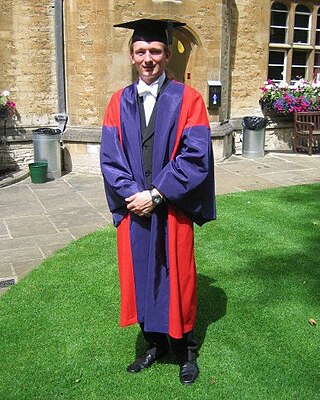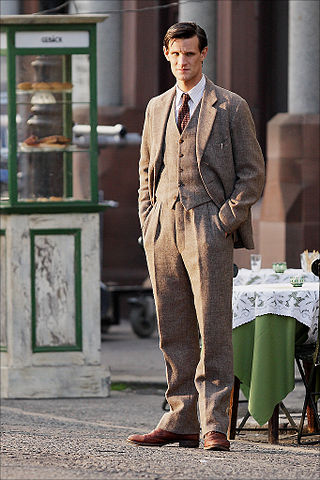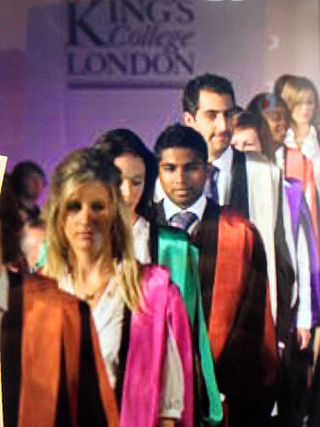Related Research Articles
Computer programming is the process of performing particular computations, usually by designing and building executable computer programs. Programming involves tasks such as analysis, generating algorithms, profiling algorithms' accuracy and resource consumption, and the implementation of algorithms. The source code of a program is written in one or more languages that are intelligible to programmers, rather than machine code, which is directly executed by the central processing unit. To produce machine code, the source code must either be compiled or transpiled. Compiling takes the source code from a low-level programming language and converts it into machine code. Transpiling on the other hand, takes the source-code from a high-level programming language and converts it into bytecode. This is interpreted into machine code. The purpose of programming is to find a sequence of instructions that will automate the performance of a task on a computer, often for solving a given problem. Proficient programming thus usually requires expertise in several different subjects, including knowledge of the application domain, specialized algorithms, and formal logic.

Mediation is a structured, interactive process where an impartial third party neutrally assists disputing parties in resolving conflict through the use of specialized communication and negotiation techniques. All participants in mediation are encouraged to actively participate in the process. Mediation is a "party-centered" process in that it is focused primarily upon the needs, rights, and interests of the parties. The mediator uses a wide variety of techniques to guide the process in a constructive direction and to help the parties find their optimal solution. A mediator is facilitative in that they manage the interaction between parties and facilitates open communication. Mediation is also evaluative in that the mediator analyzes issues and relevant norms ("reality-testing"), while refraining from providing prescriptive advice to the parties.

Black tie is a semi-formal Western dress code for evening events, originating in British and American conventions for attire in the 19th century. In British English, the dress code is often referred to synecdochically by its principal element for men, the dinner suit or dinner jacket. In American English, the equivalent term tuxedo is common. The dinner suit is a black, midnight blue or white two- or three-piece suit, distinguished by satin or grosgrain jacket lapels and similar stripes along the outseam of the trousers. It is worn with a white dress shirt with standing or turndown collar and link cuffs, a black bow tie, typically an evening waistcoat or a cummerbund, and black patent leather dress shoes or court pumps. Accessories may include a semi-formal homburg, bowler, or boater hat. For women, an evening gown or other fashionable evening attire may be worn.

A school uniform is a uniform worn by students primarily for a school or otherwise an educational institution. They are common in primary and secondary schools in various countries.

A promenade dance, commonly called a prom in American English, is a dance party for high school students. It may be offered in semi-formal black tie or informal suit for boys, and evening gowns for girls. This event is typically held near the end of the school year. There may be individual junior and senior proms or they may be combined.
A game programmer is a software engineer, programmer, or computer scientist who primarily develops codebases for video games or related software, such as game development tools. Game programming has many specialized disciplines, all of which fall under the umbrella term of "game programmer". A game programmer should not be confused with a game designer, who works on game design.

Academic dress is a traditional form of clothing for academic settings, mainly tertiary education, worn mainly by those who have obtained a university degree, or hold a status that entitles them to assume them. It is also known as academical dress, academicals, and, in the United States, as academic regalia.

A suit, lounge suit, or business suit is a set of clothes comprising a suit jacket and trousers of identical textiles generally worn with a collared dress shirt, necktie, and dress shoes. A skirt suit is similar, but with a matching skirt instead of trousers. It is currently considered semi-formal wear or business wear in contemporary Western dress codes, however when the suit was originally developed it was considered an informal or more casual option compared to the prevailing clothing standards of aristocrats and businessmen. The lounge suit originated in 19th-century Britain as sportswear and British country clothing, which is why it was seen as more casual than citywear at that time, with the roots of the suit coming from early modern Western Europe formal court or military clothes. After replacing the black frock coat in the early 20th century as regular daywear, a sober one-coloured suit became known as a lounge suit.

Formal wear or full dress is the Western dress code category applicable for the most formal occasions, such as weddings, christenings, confirmations, funerals, Easter and Christmas traditions, in addition to certain state dinners, audiences, balls, and horse racing events. Formal wear is traditionally divided into formal day and evening wear, implying morning dress before 6 p.m., and white tie after 6 p.m. Generally permitted other alternatives, though, are the most formal versions of ceremonial dresses, full dress uniforms, religious clothing, national costumes, and most rarely frock coats. In addition, formal wear is often instructed to be worn with official full size orders and medals.

Homecoming is the tradition of welcoming back alumni or other former members of an organization to celebrate the organization's existence. It is a tradition in many high schools, colleges, and churches in the United States, Canada, and Liberia.

A dress code is a set of rules, often written, with regard to what clothing groups of people must wear. Dress codes are created out of social perceptions and norms, and vary based on purpose, circumstances, and occasions. Different societies and cultures are likely to have different dress codes, Western dress codes being a prominent example.

Ashlar is finely dressed stone, either an individual stone that has been worked until squared, or a structure built from such stones. Ashlar is the finest stone masonry unit, generally rectangular cuboid, mentioned by Vitruvius as opus isodomum, or less frequently trapezoidal. Precisely cut "on all faces adjacent to those of other stones", ashlar is capable of very thin joints between blocks, and the visible face of the stone may be quarry-faced or feature a variety of treatments: tooled, smoothly polished or rendered with another material for decorative effect.

Morning dress, also known as formal day dress, is the formal Western dress code for day attire, consisting chiefly of, for men, a morning coat, waistcoat, and formal trousers, and an appropriate gown for women. Men may also wear a popular variant where all parts are the same colour and material, often grey and usually called "morning suit" or "morning grey" to distinguish it; considered properly appropriate only to festive functions such as summer weddings and horse races, which consequently makes it slightly less formal. The correct hat would be a formal top hat, or if on less spacious audience settings optionally a collapsible equivalent opera hat.

A rehearsal is an activity in the performing arts that occurs as preparation for a performance in music, theatre, dance and related arts, such as opera, musical theatre and film production. It is undertaken as a form of practising, to ensure that all details of the subsequent performance are adequately prepared and coordinated. The term rehearsal typically refers to ensemble activities undertaken by a group of people. For example, when a musician is preparing a piano concerto in their music studio, this is called practising, but when they practice it with an orchestra, this is called a rehearsal. The music rehearsal takes place in a music rehearsal space.
A sittning is in Sweden and Finland a seated meal held within a set time frame. In restaurants it may refer to a seating, i.e. the time given for a crowd to have their meal. The term is also used to denote the part of a party that is a seated meal. Though it can refer to any kind of meal, it is often used to refer to a student sittning.
Western dress codes are a set of dress codes detailing what clothes are worn for what occasion. Conversely, since most cultures have intuitively applied some level equivalent to the more formal Western dress code traditions, these dress codes are simply a versatile framework, open to amalgamation of international and local customs. This versatility has made this scale of formality a practical international formality scale.

Informal wear or undress, also called business wear, corporate/office wear, tenue de ville or dress clothes, is a Western dress code for clothing defined by a business suit for men, and cocktail dress or pant suit for women. On the scale of formality, it is considered less formal than semi-formal wear but more formal than casual wear. Informal or undress should not be confused with casual wear such as business casual or smart casual; most situations calling for “informal wear” will usually tolerate casual dress to varying extents.

Formal hall or formal meal is a meal held at some of the oldest universities in the United Kingdom and the Republic of Ireland at which students usually dress in formal attire and often gowns to dine. These are held commonly in the colleges and halls of Oxford, Cambridge, Trinity College Dublin, Durham, St Andrews, Bristol, London, the Australian sandstone universities, and Toronto.

Academic dress prescribed at the Trinity College Dublin follows a relatively complex protocol which, nonetheless, shares some particular characteristics with other universities in Ireland and with the University of Oxford in the United Kingdom.

The academic dress of the United Kingdom and Ireland has a long history and has influenced the academic dress of America and beyond. The academic square cap was invented in the UK as well as the hood which developed from the lay dress of the medieval period.
References
- ↑ "GOING TO A GASQUE". Uppsala Studentkår. Archived from the original on 8 September 2019. Retrieved 4 October 2023.